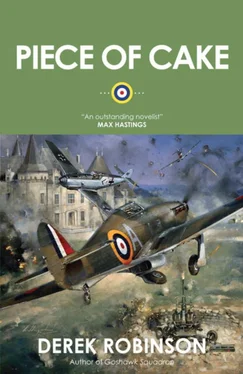“That’s a Battle, sir.” They shared the airfield with a squadron of Battle bombers: single-engined monoplanes, sadly underpowered. The Ram squinted at it. “Well, what d’you expect me to do?” he demanded. “Turn it into a pumpkin?”
He kept them training all that day, using every available aircraft. They went up in sections of three to practice interceptions on civil airliners heading for Croydon airport. It was at the end of one of these flights that Mother Cox suffered from confusion.
Cox was an average-to-good pilot most of the time. Unlike some, he had a bird-like sense of how and why the airplane flew. Where the power came from was a sweet mystery to him: by some magic the twelve cylinders in the Rolls-Royce Merlin engine made the propeller spin at a highly satisfactory speed as long as he followed certain rituals involving magnetos and boost and radiator shutter and various other conjuring tricks in the cockpit; but—despite attending many lectures on the Merlin—he never really knew what made it go. On the other hand he understood instinctively what made a Hurricane fly. As soon as he released the brakes and let it roll for takeoff, Mother Cox began to sense the wash of air over and under the wings, the hint of lift in the tailplane, the hurrying stutter of the wheels, and then that vast invisible rush that rewarded the whole machine with the gift of flight.
For Mother Cox it was all as natural as swimming in the sky: he knew how his Hurricane felt when he made it bank, or dive, or side-slip; every throb and twitch was a message to his hands and feet and the seat of his pants. The feel of speeding air on his wings was as real to him as the touch of rushing snow to a skier.
All of which made it the more unfortunate that Mother Cox’s brain had a design fault. Once in a while it failed to perform some very elementary job, like remembering the difference between left and right, or knowing which way clockwise goes.
On this day he had finished an hour of practice interceptions and he was ready for a spot of tea. He lost height on his approach to Kingsmere aerodrome; turned where he usually turned, just beyond the village church; watched his airspeed drift down from 130 to 120 to 110; and lowered his flaps. The sudden drag checked the Hurricane. Its speed fell away and the great humped nose lifted itself. He could see very little of the airfield ahead but directly below him the rusty tangle of the barbed-wire perimeter fence came into view. He left the wire behind, carefully saving height until the speed was down to 90, and as it slipped into the eighties he let the plane sink and sink, groping for the grass, still holding that last-second balance between lift and gravity until the wheels could meet the ground and run to a safe standstill: another flight, another landing, another scribbled entry in the logbook. The tail-wheel touched and raced. The Hurricane sank onto its belly and hurled Mother Cox against his straps as its gaping air-scoop rammed into the turf and hacked out a brief trench before it got ripped off and flattened, by which time the great two-bladed propeller was digging its own grave with appalling speed and a noise like a thousand circular saws gone berserk, a racket which ceased as the blades thrashed themselves to splintered death and the engine abruptly cut out. Mother Cox had done that. He was frightened and bewildered but he had just enough sense left to do that. The mutilated Hurricane skidded along with its nose in the dirt while Mother Cox wondered what the holy hell had gone wrong. It couldn’t be his fault. The undercarriage was locked down. The red lights proved that.
Or should they be green?
Oh Christ.
The Ram was sitting at his desk, leafing through an Air Ministry publication, when Mother Cox reported to his office ten minutes later. He did not look up.
“Hitler has two thousand bombers,” the Ram said. He spoke so softly that Cox had to lean forward. “We have fewer than five hundred fighters. Now some of our fighters are biplanes, so they have two wings. Does that make them twice as fast?” He looked up. His stare was intense and unblinking.
“No, sir.”
“Half as fast?”
Mother Cox didn’t know what to say. He could hear himself breathing; it sounded heavy and deliberate, like a sleeping animal; after a couple of seconds he sniffed sharply, just to break that awful rhythm. “Our biplanes aren’t much good, sir,” he mumbled. A fear was forming at the back of his mind: the Ram was going to have him transferred to some bloody old Gladiator squadron.
“Not much good,” the Ram murmured. “Not much good… That’s far too vague, Cox. It really is. War is a precise and calculated business. You shoot to kill. If you miss a Hun, would you say that you are not much good?” Again, the rigid stare. Cox briefly shook his head. “Would you say that you are bloody awful?” the Ram asked. His voice was rising. Cox just looked, his expression as flat as his spirits. “Would you say that you are sickeningly lousy?” the Ram demanded. He threw the Air Ministry publication into a desk drawer and kicked it shut; the bang made Cox jump. “Would you say that you are a sodding disgrace to the Royal Air Force in general and a stinking menace to Fighter Command in particular?” The Ram stood up. “Would you say that you are acting as a collaborator and fifth columnist for the benefit of Nazi Germany,” he shouted, “and therefore a traitor, a filthy despicable traitor to your own country?” He hit that last word with a passion that made the clerks in the next room stop typing.
“Sir, that’s not fair,” Cox protested. “Damn it all, I only bust the undercart and—”
“Not fair?” the Ram roared. “Not fair? What if Hitler sends his two thousand bombers against us tomorrow? What if his entire bloody air force is on its way here now? How do you plan to shoot them down, Cox? Are you going to run into the wind with your arms flapping and a Colt revolver gripped between your tiny teeth? Because you’ve made very damn sure that one Hurricane won’t fly, haven’t you? Plowed up my nice field with its poor suffering belly, didn’t you? Bust the prop, gave the engine a hernia, and dragged the airplane’s guts through the dirt while you sat in the cockpit picking your nose and listening to Ambrose and his Orchestra on your radio, and don’t tell me I’m wrong because the control tower kept screaming at you throughout your approach but you weren’t bloody well paying attention!”
Mother Cox looked at his flying boots.
“This squadron’s gone to hell in my absence,” the Ram said. His voice had fallen to a rasp. “You treat it like a bunch of playboys in a private flying club. Well, by God I’ll see you all in hell first. I’ll kick every ass in this squadron until either you make yourselves worthy of it or my right leg gets worn to a bloody stub.” He clipped Cox with his shoulder as he strode past him and flung open the door. The faces of the clerks were diplomatically blank. “Get a shovel and fill in that disgusting hole, Cox,” he ordered. “You break the shovel and I’ll have you court-martialled. Go.”
Mother Cox went. It was a very long hole, and darkness had fallen by the time he filled the last of it.
The next day was the last day of August. A sea-fog reached Kingsmere before dawn. By eight-thirty, when the pilots assembled in one of the hangars, it was still blowing across the field in slow drifts of smoky gray, chilling everything it touched.
“I see the war-clouds are gathering again,” Patterson said. A couple of heads turned. He was reading a newspaper.
“Are those new war-clouds?” Stickwell asked. “Or are they the same old war-clouds that have been gathering all year?”
Patterson consulted his newspaper. “It doesn’t say,” he said. “All it says is the war-clouds are gathering and once again Europe is at the crossroads.”
Читать дальше












